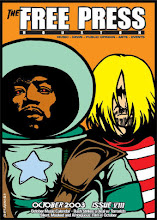My Bloody Valentine 3-D

A scribe doesn't rate a film like My Bloody Valentine 3-D like, say, Benjamin Button or Slumdog Millionaire. But compared to the other horror movie released in 09 (The Unborn) My Bloody Valentine 3-D elicits a yawn. Compared to the slate of early 1980s 3-D films, titles like Friday the 13th Part III, or Parasite, MBV3D wins by a nose. Actually a remake of a 1981 film by the same name, My Bloody Valentine chronicles an insane miner who kills with a pick-ax.
The current Valentine is full of loud noise for scares and naked victims for its R-rating. There's a slight rooting interest in the last act as Jamie King must decide which of the suspects (her husband or her ex boy friend) is the sadistic killer. The director, Patrick Lussier, has worked for Wes Craven as an editor and also helmed Dracula 2000, a movie I defy anyone to remember plot points about.
There are a couple of things Lussier does right, and that ring true to the genre. One, he casts Tom Atkins (Halloween III: Season of the Witch) in the hambone supporting role of the mining town's ex-sheriff. Second, and this is the coolest effect of the 3-D visuals, the establishing shots are done in the style of tilt-shift photography. This gives everything a miniature look especially from high angles, although it would hardly be reason enough to recommend the entire film.










